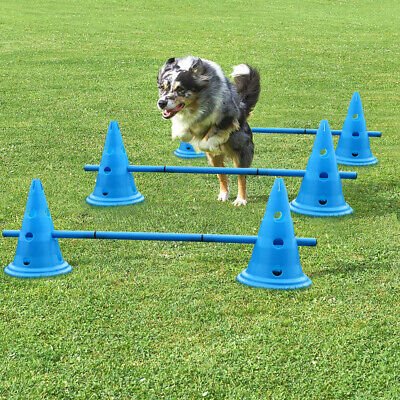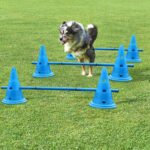Welcoming a new puppy into your home is a joyful and exciting experience. They’re bundles of energy, curious about everything around them, and eager to learn as much as possible about the world. To keep your furry friend happy and well-adjusted, it’s crucial to engage them in activities that stimulate their minds and bodies. In this blog post, we’ll explore a variety of fun and effective ways to entertain your puppy, ensuring they’re both entertained and enriched. Whether indoors or outdoors, come rain or shine, we’ve got you covered with creative ideas to keep that tail wagging!
Indoor Puppy Activities for Rainy Days
When the weather outside is frightful, indoor activities can be delightful! With some creativity, you can turn a rainy day into an exciting adventure for your pup.
Interactive Toy Recommendations
Interactive toys are a wonderful way to keep your puppy entertained and stimulated indoors. These toys often require problem-solving skills and can help develop your pup’s cognitive abilities. Chew toys that dispense treats, puzzle feeders, and squeaky toys that challenge their minds are all great options. Brands like Kong, Outward Hound, and Nina Ottosson offer a range of engaging toys that will keep your puppy occupied for hours.
Giving your puppy toys that challenge them not only keeps them busy but also helps prevent destructive behaviors. Puppies are naturally curious and sometimes mischievous, so providing them with a task can redirect their energy positively. Plus, it’s a rewarding way to spend quality time together.
Remember to rotate toys regularly to keep things fresh and exciting. This way, your pup always feels like they’re discovering something new, maintaining their interest and enthusiasm.
Check out these durable puppy toys on AmazonDIY Agility Course Ideas
You don’t need a professional setup to create an agility course for your puppy at home. With a little imagination and household items, you can design an obstacle course that challenges your pup’s physical abilities and coordination. Use chairs and broomsticks to create jumps, lay out blankets as tunnels, and set up pillows for your puppy to weave through.
Training your puppy on an agility course is an excellent way to boost their confidence. It helps them learn to follow commands and pay attention to you, strengthening the bond between the two of you. Plus, it’s a great way to expend some of that puppy energy!
Be sure to keep the course safe and suitable for your puppy’s age and size. Start with simple obstacles and gradually increase the difficulty as your puppy becomes more skilled.
Treat Hunt Game
Turn mealtime into a fun game by creating a treat hunt for your puppy. Hide small treats around a safe, confined area of your home and encourage your puppy to sniff them out. This game taps into their natural instincts and provides mental stimulation.
A treat hunt is not only fun but also educational for your puppy. It helps enhance their sense of smell and encourages problem-solving as they work out where the treats are hidden. Realizing that their nose can lead them to tasty rewards reinforces positive behavior.
To add an extra layer of interest, vary the hiding spots each time you play. Your puppy will be excited to discover new places, making the game continually engaging.
Outdoor Puppy Activities for Sunny Days
Sunny days are perfect for outdoor adventures with your puppy. Exploring the great outdoors provides ample opportunities for fun and learning.
Park Playtime Tips
Taking your puppy to the park is a fantastic way to help them burn off energy while socializing with other dogs and people. Choose a local park that is safe and dog-friendly, and bring along some toys to make the outing even more enjoyable.
While at the park, engage your puppy in games like fetch or tug-of-war. These activities provide excellent exercise and help reinforce training commands such as “sit,” “stay,” and “come.” Plus, playing with other dogs helps your puppy develop essential social skills.
Always keep an eye on your puppy to ensure their safety, and be mindful of any park rules regarding leash use and dog etiquette.
Introduction to Leash Training
Leash training is a valuable skill that ensures enjoyable walks with your puppy. Start by letting your puppy get used to wearing a collar or harness indoors. Once they’re comfortable, practice walking on a leash in a quiet, familiar environment.
Use positive reinforcement techniques, such as praising and rewarding your puppy when they walk calmly beside you. If they pull on the leash, stop walking and wait for them to settle before continuing. Consistency is key, so practice regularly to help your puppy learn.
Leash training is an excellent opportunity to teach your puppy patience and discipline, making it easier to enjoy outdoor activities together.
Water Play Safety Guide
For puppies that love water, a sunny day is the perfect time for a splashy adventure. Whether it’s a kiddie pool in the backyard or a trip to a dog-friendly beach, water play can be lots of fun.
Ensure your puppy’s safety by supervising them at all times and choosing shallow water areas. Not all puppies are natural swimmers, so introduce them to water gradually and gently. Consider using a doggy life jacket for added security, especially if you’re near deeper water.
Keep play sessions short and sweet, and always have fresh drinking water available to prevent dehydration.
Socialization Activities for Puppies
Socialization is essential for your puppy’s development, helping them grow into well-adjusted adult dogs. Introduce them to different environments, people, and animals to build their confidence.
Puppy Playdates
Organizing playdates with other puppies is a great way to promote healthy socialization. Puppies learn crucial skills through play, such as bite inhibition and body language interpretation. It also helps reduce fear and anxiety towards other dogs.
Choose playmates who are similar in size and energy level to ensure safe interactions. Monitor play to prevent any rough behavior and step in if necessary. Positive play experiences help your puppy become more comfortable around other dogs.
Setting up regular playdates allows your puppy to form friendships and gain exposure to different play styles and personalities.
Puppy Training Classes
Enrolling your puppy in a training class offers numerous benefits. It’s a structured environment where they can learn essential commands and manners while interacting with other dogs and people.
Training classes provide a safe space for your puppy to practice social skills. They also offer guidance and support from experienced trainers, helping you address any behavioral concerns.
Participating in a class strengthens the bond between you and your puppy as you work together to achieve training goals.
Tips on Safe Social Interaction
When introducing your puppy to new experiences, it’s important to ensure their safety. Gradual exposure, positive reinforcement, and careful monitoring are key.
Start with controlled environments where your puppy feels comfortable and gradually introduce them to more challenging situations. Reward them for calm behavior and provide reassurance if they seem unsure.
Watch for signs of stress or discomfort, such as cowering or excessive barking, and remove your puppy from situations that make them uneasy. With time and patience, your puppy will become more confident and relaxed in social settings.
The Benefits of Regular Puppy Activities
Engaging your puppy in regular activities offers a range of benefits that contribute to their overall well-being and happiness.
Bonding with Your Puppy
Participating in activities together strengthens the bond between you and your puppy. It builds trust and helps establish you as a reliable source of fun and comfort.
Through shared experiences, you gain a better understanding of your puppy’s personality and preferences, allowing you to cater to their individual needs.
The time spent together creates lasting memories and a deep connection that enhances your relationship.
Physical and Mental Health Benefits
Regular activities keep your puppy physically fit and mentally stimulated, reducing the risk of obesity and boredom-related behaviors. Exercise supports healthy growth and development, while mental challenges sharpen their cognitive skills.
Interactive play, training sessions, and exploration all contribute to a well-rounded and happy puppy.
Enhancing the Training Process
Incorporating activities into your puppy’s routine makes training more enjoyable and effective. Playtime and exercise provide opportunities for reinforcing commands and practicing good behavior.
Engaging activities help your puppy burn off excess energy, making them more receptive to training. They also teach your puppy to focus and follow instructions, leading to a well-behaved companion.
Wrapping Up the Fun
Keeping your puppy entertained and engaged is essential for their happiness and development. By exploring a variety of indoor, outdoor, and socialization activities, you can provide your puppy with a rich and fulfilling life.
Remember, every puppy is unique, so tailor activities to suit their personality and preferences. Encourage interaction and share your experiences with fellow dog owners to build a supportive community.
Fact Check
- Leash Training: The methods described, such as using positive reinforcement and stopping when the puppy pulls on the leash, are well-supported by dog training experts. This approach encourages good behavior without causing anxiety.
- Water Play Safety: The recommendations for supervising puppies during water play and introducing them gradually to water are essential for their safety. Using life jackets for dogs in deep water is also recommended by trainers and veterinarians.
- Socialization: Introducing puppies to diverse environments and other dogs is crucial for their social development. Studies highlight that early socialization can mitigate behavioral issues later in life.
- Puppy Playdates: The benefits of playdates, including learning bite inhibition and body language, are widely acknowledged in canine behavior studies. Monitoring play for roughness is also an important safety measure.
- Training Classes: Enrolling puppies in training classes is indeed beneficial. These classes not only enhance obedience but also provide socialization opportunities.
- Signs of Stress: Recognizing signs of stress in puppies, such as cowering or excessive barking, is critical for their well-being. The guidance to remove them from uncomfortable situations aligns with best practices in puppy training.
- Physical and Mental Health: Regular activities and exercise contribute significantly to a puppy’s physical health and mental stimulation. Numerous sources confirm the link between exercise, training, and the prevention of behavioral issues in dogs.
- Bonding through Activities: Engaging in shared activities enhances the owner-puppy bond, which is supported by behavioral science research on animal companionship.
In summary, the guidelines and suggestions provided in the article are aligned with established training and canine behavior practices.










